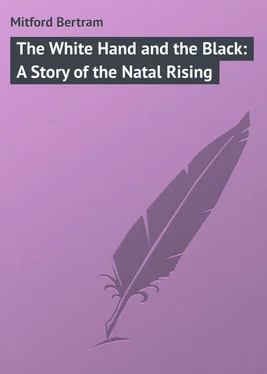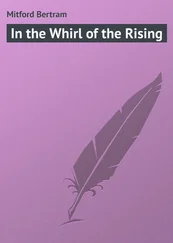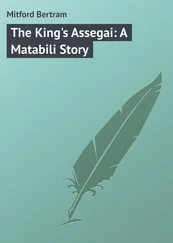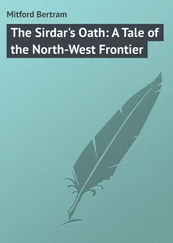Bertram Mitford - The White Hand and the Black - A Story of the Natal Rising
Здесь есть возможность читать онлайн «Bertram Mitford - The White Hand and the Black - A Story of the Natal Rising» — ознакомительный отрывок электронной книги совершенно бесплатно, а после прочтения отрывка купить полную версию. В некоторых случаях можно слушать аудио, скачать через торрент в формате fb2 и присутствует краткое содержание. Жанр: foreign_prose, на английском языке. Описание произведения, (предисловие) а так же отзывы посетителей доступны на портале библиотеки ЛибКат.
- Название:The White Hand and the Black: A Story of the Natal Rising
- Автор:
- Жанр:
- Год:неизвестен
- ISBN:нет данных
- Рейтинг книги:4 / 5. Голосов: 1
-
Избранное:Добавить в избранное
- Отзывы:
-
Ваша оценка:
- 80
- 1
- 2
- 3
- 4
- 5
The White Hand and the Black: A Story of the Natal Rising: краткое содержание, описание и аннотация
Предлагаем к чтению аннотацию, описание, краткое содержание или предисловие (зависит от того, что написал сам автор книги «The White Hand and the Black: A Story of the Natal Rising»). Если вы не нашли необходимую информацию о книге — напишите в комментариях, мы постараемся отыскать её.
The White Hand and the Black: A Story of the Natal Rising — читать онлайн ознакомительный отрывок
Ниже представлен текст книги, разбитый по страницам. Система сохранения места последней прочитанной страницы, позволяет с удобством читать онлайн бесплатно книгу «The White Hand and the Black: A Story of the Natal Rising», без необходимости каждый раз заново искать на чём Вы остановились. Поставьте закладку, и сможете в любой момент перейти на страницу, на которой закончили чтение.
Интервал:
Закладка:
“They are ready,” answered Manamandhla, who was striding beside the other, easily keeping pace with the horse. “They are ready – ah-ah – very ready.”
“That is well – very well.”
Here was an edifying picture, was it not, this zealous missionary, labouring day and night to spread the good news among the benighted heathen, and he one of their own colour? They, too, waiting to welcome him, to give up their night’s rest even, in order to hang upon his words – truly a heart-stirring picture, was it not?
We shall see.
Guided by Manamandhla by short cuts across the veldt, the traveller was not long in reaching his destination. His arrival had been momentarily expected, and with the first distant sounds of his horse’s hoofs, the carcase of a recently slaughtered goat had been quartered up and placed upon a fire of glowing embers. The preacher rubbed his fat hands together with anticipatory delight as his broad nostrils snuffed from afar the savoury odour of the roast.
“Ah brother, the people are ever hospitable to those who bring them tidings of the Cause,” he remarked, complacently.
“And to those who do not,” rejoined the Zulu.
Assuredly the emissary had no reason to complain of the substantial nature of his reception, and so decided that worthy himself, as he sat within the chief’s hut, tearing the juicy meat from the ribs with his teeth, and washing it down with huge draughts from the bowls of tywala which had been brought in. Ah, it was good to live like this. Meat – everywhere – plenty of it, wherever he went – meat – fresh, and succulent and juicy, as different as day from night to the dried up, tasteless, insipid stuff to which he sat down when in civilisation. Tywala too – newly brewed, humming, and, above all, plentiful. Yes, it was good! He had taken off his black coat and waistcoat, mainly with the object of preserving them from grease. Indeed had he followed his own inclination it is far from certain that he would not have taken off everything else. It was a disgusting spectacle, this fat, smug, black preacher, sitting there in his shirt, his white choker all awry, tearing at the steaming bones like a dog, his face and hands smeared with grease; a revolting sight, immeasurably more so than that of the ring of unclothed savages who were his entertainers and fellow feasters.
Nothing was heard but the champ of hungry jaws. Such a serious matter as eating must not be interfered with by conversation. At last there was very little left of the carcase of the goat but the bones, and one by one the feasters dropped out and leaned back against the walls of the hut.
The latter was lighted by two candles stuck in bottle necks, a device learned from the white man. Babatyana and several others started pipes, also an institution learned from the white man. But Manamandhla, the conservative Zulu, confined himself to the contents of his snuff-horn. Secretly, in his heart of hearts, he held his entertainers in some degree of contempt, as became one of the royal race. Babatyana was an influential chief, but only so by favour of the whites. What was he but a Kafula (term of contempt used by Zulus for Natal natives)? But Manamandhla was far too shrewd to impair the success of his mission by suffering any of his secret feelings to appear.
All the same, although he lived on the wrong side of the river from the other’s point of view, there was very little admixture of baser blood in Babatyana’s system. His father had been a Zulu of pure blood and his mother very nearly so. They had crossed into Natal as refugees, after Nongalaza defeated Dingane, and had there remained. Seen in the dim light of the candles, Babatyana was an elderly man, with a shrewd, lined face; in fact there was no perceptible difference in his aspect or bearing from that of those who affected to despise him. Now he turned to his guest.
“The news, brother, what is it?”
“The news? Au ! it is great. Everywhere we have our emissaries; everywhere the people are listening. They are tired of being dogs to the whites: tired of having to send their children away to work, so as to find money to pay the whites. Soon our plan of deliverance will be complete, soon when we have brought home universal brotherhood to those of one colour – and, brothers, the time is now very near.”
“And that time – when it comes – who will lead the people, Umfundisi ?” asked an old head-ringed man who was seated next to the chief.
“The leader will be found,” was the ready answer. “It may be that he is found – already found.”
“Is he found on this side of the river or on the other?” went on the old man, who was inclined to “heckle” the visitor.
“That, as yet, is dark. But – he is found.”
A murmur went round the group. They were becoming interested. Only Manamandhla remained perfectly impassive. He made no remarks and asked no questions.
The conversation ran on in subdued tones, which however grew more and more animated. The emissary was glib of tongue and knew how to hold his audience. At last Babatyana said:
“It sounds well, Jobo. Now is the time to tell it – or some of it – to the people outside. They wait to hear.”
The Rev. Job Magwegwe – by the way the name by which the chief had addressed him was a corruption of his “Christiana” name – was an educated Fingo, hailing from the Cape Colony, where he had been trained for a missionary, and finally became a qualified minister in one of the more important sects whose activity lay in that direction. But he promptly saw that in the capacity of missionary he was going to prove a failure. Those of his own colour openly scoffed at him. What could he teach them, they asked? He was one of themselves, his father was So-and-So – and no better than any of them. The whites could teach them things, but a black man could not teach a black man anything. And so on.
But luck befriended the Rev. Job. The Ethiopian movement had just come into being, and here he saw his chance. There was more to be made by going about among distant races where his origin was not known, living on the fat of the land, and preaching a visionary deliverance from imaginary evils to those well attuned to listen, than staying at home, striving to drill into a contemptuous audience the “tenets” of a dry-as-dust and very defective form of Christianity. So he promptly migrated to Natal, and being a plausible, smooth-tongued rogue soon found himself in clover, in the official capacity of an accredited emissary of the “Ethiopian Church,” whose mission it was to instil in the native mind the high-sounding doctrine of “Africa for its natives.”
Chapter Six.
A Native Utopia
The open space outside the kraal was thronged. Hundreds had collected in obedience to the word of the chief. More were still coming in, and the preacher rubbed his fat hands together with smug complacency. Your educated native is nothing if not conceited, and the Rev. Job Magwegwe was no exception to this rule. Here was an audience for him; a noble audience, and, withal an appreciative one.
His appearance was greeted by a deep murmur from the expectant crowd, which at once disposed itself to listen. He had resumed his black coat and waistcoat and settled his white choker; he was not going to omit any accessory to his clerical dignity if he knew it.
He led off with a long prayer, to which most of those present listened with ill-concealed boredom, but the smug self-conceit of the man had captured his better judgment, and he was only brought up by Babatyana remarking in an audible aside that the people had not assembled to take part in a prayer meeting but to hear the news. So he took the hint and started his address.
He began by sketching the history of the people, within their own time. Since the days of the old wars they had increased immensely and were still increasing, so that soon the land would not be able to hold its population. It would hold them but for the white man. The white man. But was this the white man’s land? Did Nkulunkulu (Literally, “The Great Guest.” one of the names for the Deity) give him this land? No. The white man came over the sea in ships and took it. Nkulunkulu said “This is the black man’s land and here have I placed him,” yet the white man took it. The whites came over in small numbers, then more. But even now what were their numbers? Why, a handful, a mere handful. The whites who ruled them could live in an ostrich’s nest, when compared to the blacks whom they had dispossessed. And why had they been able to dispossess them? Because there was no unity among the native nations. Each was jealous of the other and none could combine. The time, however, was at hand when these dissensions should be of the past; when all the native nations should unite, when their native land should belong to them and not to the white man, when the Amazulu and the Basutu, the tribes in Natal and the Amampondo and the Amaxosa should all possess their own again, should all dwell together as brothers, none lording it over the other, should dwell together in peace and unity in the land which Nkulunkulu had given to them – to them and not to the white man.
Читать дальшеИнтервал:
Закладка:
Похожие книги на «The White Hand and the Black: A Story of the Natal Rising»
Представляем Вашему вниманию похожие книги на «The White Hand and the Black: A Story of the Natal Rising» списком для выбора. Мы отобрали схожую по названию и смыслу литературу в надежде предоставить читателям больше вариантов отыскать новые, интересные, ещё непрочитанные произведения.
Обсуждение, отзывы о книге «The White Hand and the Black: A Story of the Natal Rising» и просто собственные мнения читателей. Оставьте ваши комментарии, напишите, что Вы думаете о произведении, его смысле или главных героях. Укажите что конкретно понравилось, а что нет, и почему Вы так считаете.












